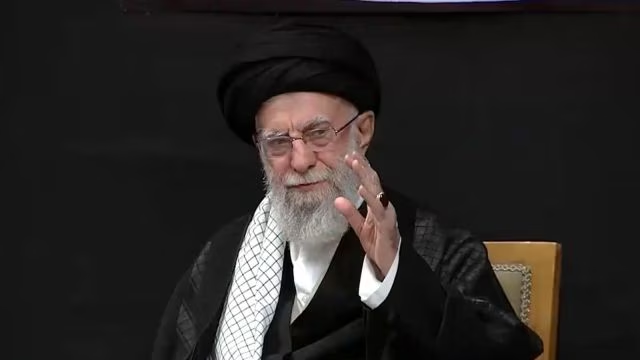Tehran, July 6: Iran’s Supreme Leader Ayatollah Ali Khamenei made his first public appearance since the country’s 12-day war with Israel, attending a religious ceremony in Tehran to mark Ashura, the holiest day on the Shia Muslim calendar.
State media aired footage on Saturday showing the 85-year-old leader entering the Imam Khomeini Mosque, where he waved and nodded to a crowd of mourners chanting his name. The appearance marks Khamenei’s return to public view after weeks of absence during and after the conflict, which erupted on June 13 and ended with a ceasefire on June 24.
Until now, Khamenei had issued only prerecorded messages and avoided live events, fueling speculation about his health and Iran’s internal decision-making during the conflict.
Iran has acknowledged more than 900 people were killed and thousands injured in the war. In retaliation, Iranian missile strikes killed at least 28 people in Israel. The United States joined the conflict on June 22, bombing three Iranian nuclear facilities in response to Iranian actions and perceived threats in the region.
The damage to Iran’s nuclear infrastructure was confirmed by officials in Tehran, who have since denied access to international inspectors from the United Nations nuclear watchdog, the International Atomic Energy Agency (IAEA).
Tensions between Washington and Tehran escalated further after former U.S. President Donald Trump, in a series of social media posts, warned that the U.S. knew Khamenei’s whereabouts but had no plans to target him — “at least for now.”
In a June 26 prerecorded address, Khamenei dismissed Trump’s calls for Iranian surrender, stating Tehran had delivered a “slap to America’s face” by targeting a U.S. airbase in Qatar. Trump responded by ridiculing Khamenei: “Look, you’re a man of great faith. A man who’s highly respected in his country. You have to tell the truth. You got beat to hell.”
Inspectors from the IAEA, who had remained in Iran during the fighting, left the country after President Masoud Pezeshkian signed a law on Wednesday suspending cooperation with the agency. IAEA Director-General Rafael Grossi on Friday emphasized “the crucial importance” of renewed dialogue to allow monitoring and verification of Iran’s nuclear activities.
Despite the deteriorating situation, Iranian Foreign Minister Abbas Araghchi said on Thursday that Iran remains committed to the Treaty on the Non-Proliferation of Nuclear Weapons (NPT), dismissing speculation that Tehran may withdraw from the pact.
Iran had been engaged in nuclear talks with the U.S. prior to the war, aimed at reviving the 2015 Joint Comprehensive Plan of Action (JCPOA), which the Trump administration withdrew from in 2018.
With the ceasefire holding and Ashura commemorations under way, Khamenei’s reappearance may signal a shift in Iran’s domestic and international posture – though tensions over the country’s nuclear ambitions and regional role remain unresolved.
